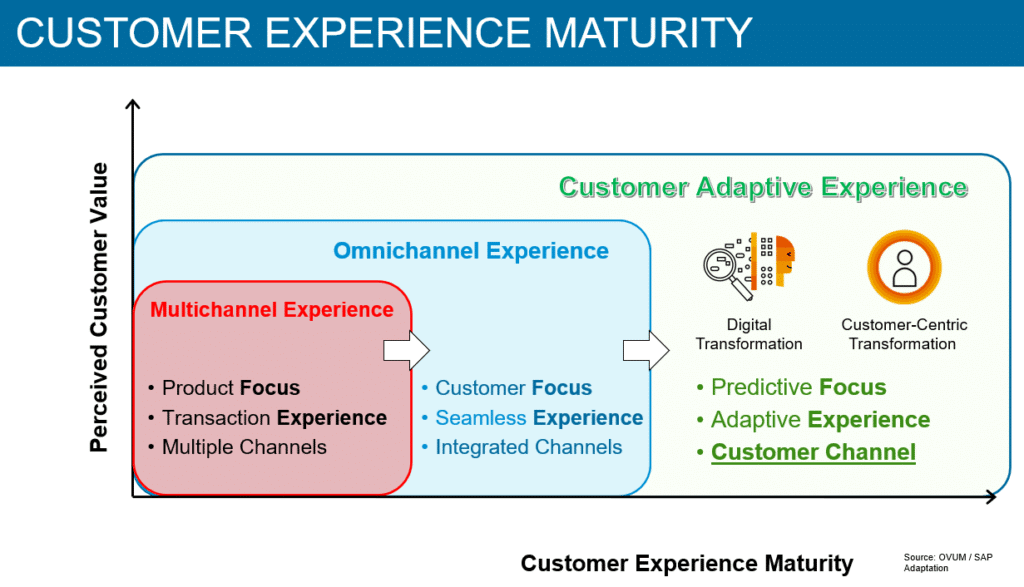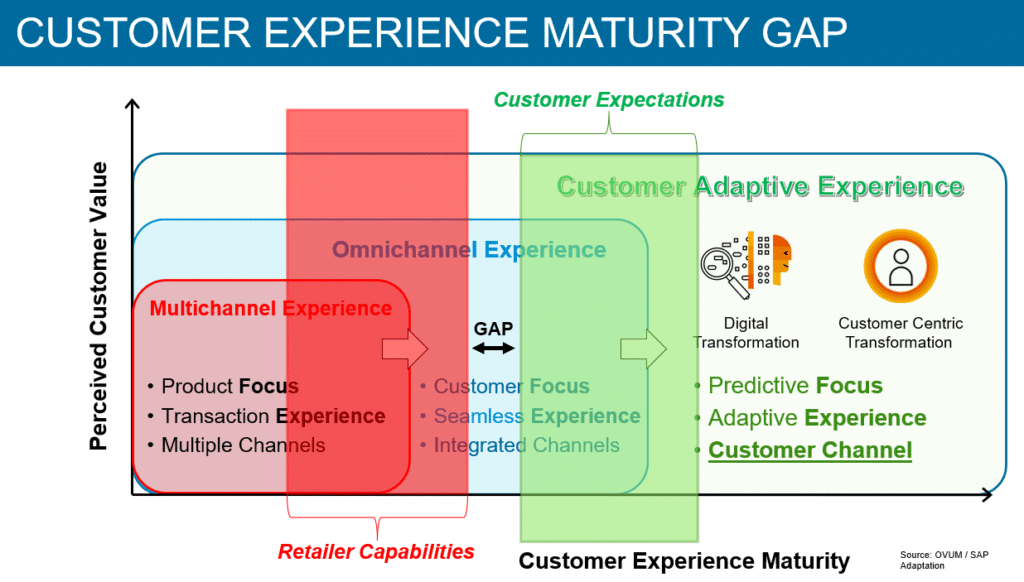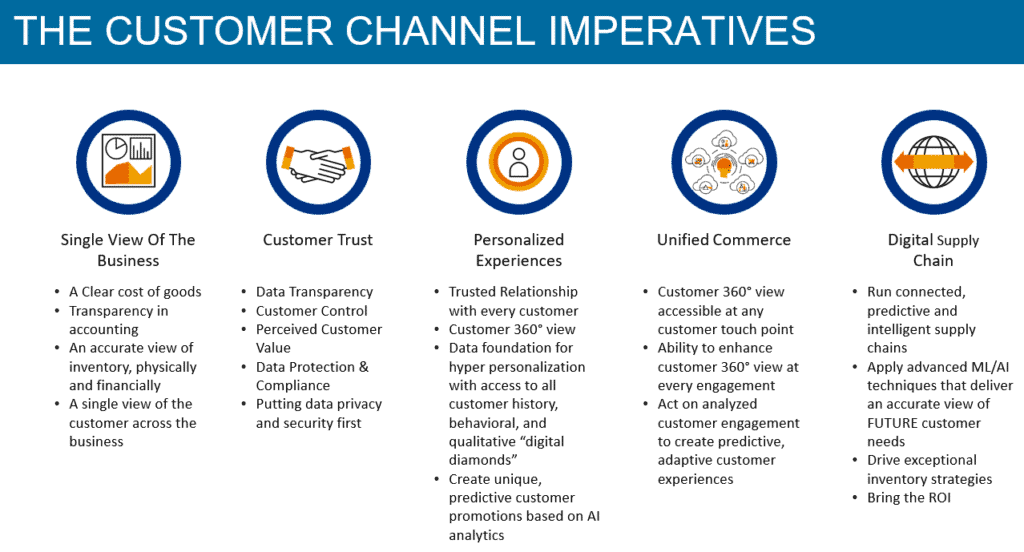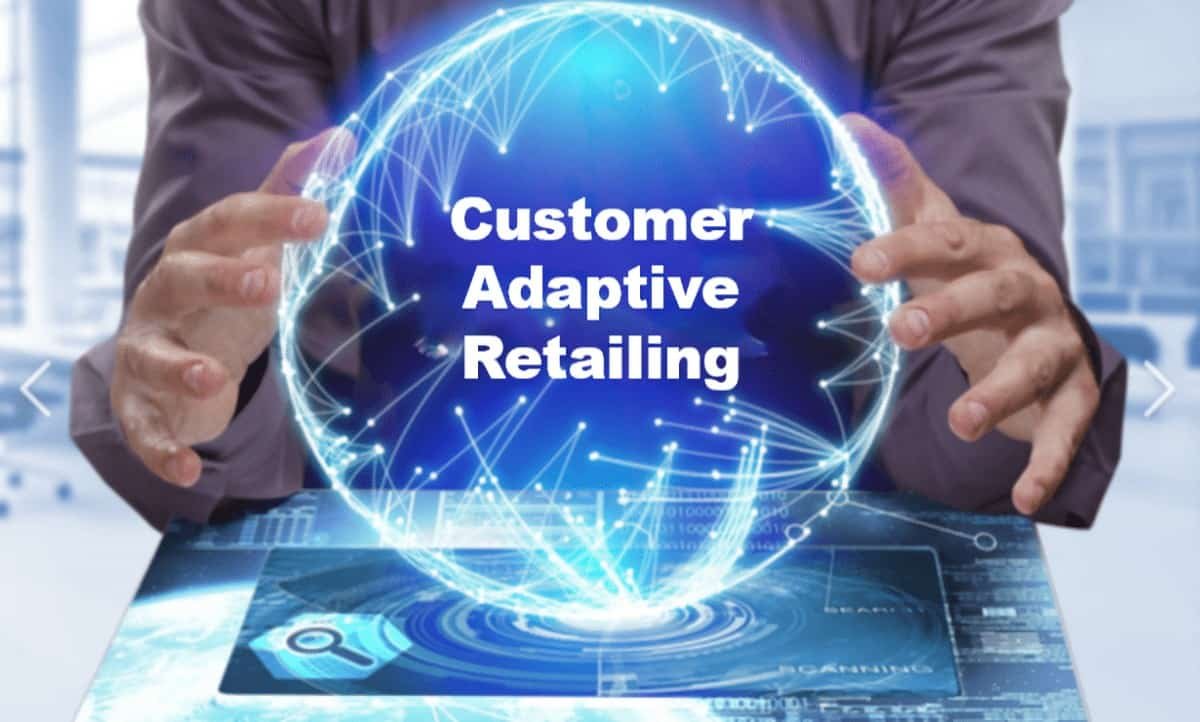Customer Experience Maturity is the Path to Hyper-Personalization
Customer Adaptive Retailing is the transformation beyond omnichannel to a single, adaptive focus on the customer. It requires retailers to transition from thinking in terms of multiple shopping channels to focusing on the CUSTOMER as the only channel and wrapping every aspect of their business around each customer at every touch point. The first question a customer adaptive retailer will ask when encountering any business challenge is: “How Does This Impact The Customer?”
The ability to deliver effective and compelling personalized customer experiences is directly dependent on a retailer’s existing level of Customer Experience Maturity. Customer Experience Maturity is an evolution and requires challenging transformational shifts between each phases. Every retailer falls into one of these three phases of customer experience maturity:
- In Multichannel : the focus is the product, and the experience is transactional and typically different between channels
- In Omnichannel: the focus becomes the customer, and the experience is now seamless across channels. A single shopping experience can shift between channels without friction, and no one channel has exclusive benefits.
- In Customer Adaptive: the focus becomes highly relevant to individual customers, intelligently predicting their needs while adapting to them “in-the-moment” to create a compelling personalized experience that goes beyond just satisfying them – it adds value to their life in a way that, if done consistently, projects the retailer as a valuable extension of their life.

The Impetus Behind Customer Hyper-Personalization
While most retailers today are straddling the fence between the multichannel and omnichannel customer experience maturity levels, today’s digitally mature customers, especially the Gen-Z generation are straddling the fence between omnichannel and customer adaptive expectations, creating a gap between what they demand from their preferred retailers and the experience that can be delivered by them.

The Conduit for Customer Hyper-Personalization
The rapidly expanding base of personalized customer data, and the ability to aggregate and harness this data via customer data platforms and advanced analytics, provide unprecedented opportunities to predict the wants and needs of individual customers in ways that add value to their lives through hyper-personalized, value-add customer experiences. The potential return on investment is a greater opportunity to create and maintain customers for life while enhancing their lifetime customer value
Today’s highly integrated, intelligent, and extensible retail platforms can enable retailers for the first time in history to create personal relationships with individual customers and continuously sense and adapt to emotions – from gestures, tone, and body language to purchasing patterns and preferences – to enhance, create and improve unique customer experiences. SAP’s Intelligent Enterprise for Retail is one such platform, and encompasses the five key functional imperatives required for Customer Adaptive Retailing:

Challenge Unlocks the Door to Great Opportunity
Two core challenges confront retailers that strive to become Customer Adaptive Retailers:
- Digital Transformation which ensures that your systems are highly integrated and capable of capturing and analyzing every engagement with a customer at any touchpoint in their customer journey thus enabling every employee to access this critical information to create compelling personalized customer experiences when the customer chooses to engage again, and,
- Cultural Transformation which transforms a retailer’s business culture from a product and sales-driven focus to a customer-centric, customer-experience focus.
One without the other will significantly reduce a retailer’s ability to bridge the gap between customer expectations and retailer ability. Far too often retailers myopically focus on digitally transforming their businesses as it’s now easier to justify given the pandemic, and with the help of a good partner, more palatable to embark upon. Cultural change however is very challenging and much easier to avoid or push down the road. Challenges aside, The retail industry today may be facing its greatest inflection point: Adapt or Die.
I work every day with top-tier retailers around the world, and the majority of them acknowledge the value and importance of customer adaptive retailing given its potential to improve customer retention and lifetime customer value. But it remains to be seen how many will embark upon and successfully cross the finish line of this ambitious retail biathlon. I believe many will pursue a digital transformation, in fact, many have already begun driven by the pandemic. Cultural transformations are notoriously difficult, however, which is why most retailers will avoid or delay them (see Why Every Executive Should be Focused on Culture Change Now from MIT Sloan). It’s important to emphasize this point – One without the other will not deliver the anticipated value because:

Retailer’s Embracing Customer Adaptive Retailing
One retailer that is actively pursuing Customer Adaptive Retailing is French-based multi-national Carrefour. They fully acknowledge and embrace the challenges associated with pursuing with such an ambitious undertaking as stated in an article entitled A Customer-Centric Tech and Data Transformation in Interface Magazine (I highly suggest this read as it provides in-depth insight from a retailer’s perspective on the opportunities and challenges associated with pursuing a customer adaptive strategy):
“Change, although essential, is often feared, resisted or considered politically unpalatable to many business leaders. Nevertheless, the situation remains the same: Adapt or Die“
For more insight on the unprecedented forces that are enabling retailers to create hyper-personalized customer experiences, read my blog entitled
